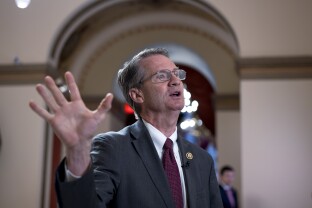Halfway through what House Republicans billed as “crypto week,” they still don’t have a plan on how to pass any cryptocurrency legislation, and President Donald Trump’s August deadline for Congress to get something on his desk is only ticking closer.
That’s their situation after days of negotiations, a meeting with Trump in the Oval Office and a series of procedural votes that have lasted hours. They’re even on a holding pattern on advancing the GENIUS Act, the Senate’s landmark cryptocurrency legislation, which was expected to be a legislative slam dunk.
“We’re working it out,” Speaker Mike Johnson told reporters as he walked out of an hours-long meeting with Republicans holdouts Wednesday afternoon.
An hour later, Rep. Tim Burchett, a Republican holdout, came out and said others in his camp were nowhere close to reaching an agreement.
“I used to have a saying in the state legislature in Nashville: If you go a little slower, you get there a little faster,” Burchett said.
Burchett added that he’d been informed by Republican leadership to “just hang out for a little while” to see if Republicans could work out an agreement. “There’s gonna be some resolve but people still have some questions,” he said.
The main issue? How to pass three pieces of legislation regulating digital assets.
The GENIUS ACT, a bill that passed the Senate with bipartisan support, is intended to codify payments made with stablecoins, a type of cryptocurrency tied to physical assets like the dollar. Given the bill’s more narrow scope and the fact it had already gone through complex negotiations in the Senate, Republicans, including the chair of the House Financial Services Committee, began the week celebrating the legislation as though it had already passed.
But there’s another piece of legislation, the CLARITY Act, which is intended to regulate the broader digital assets market, that Republicans from the House committees on Finance and Agriculture are hoping can hitch a ride through the House with the GENIUS Act. And some members of the House Freedom Caucus reportedly hope the Anti-CBDC Surveillance Act, which would ban the Federal Reserve from issuing digital currencies, gets attached onto the National Defense Authorization Act, a bill that must be passed before the end of the year.
But Wednesday’s stalemate was really just an extension of chaos from earlier in the week.
On Tuesday afternoon, after 13 House Republicans from the House Freedom Caucus voted with Democrats against advancing the three bills for a final vote on the House floor, Johnson cancelled votes for Tuesday to hammer out a plan. The Republican holdouts initially demanded that the three bills be packaged together.
Later on Tuesday, President Donald Trump wrote on Truth Social that he met with the holdouts in the Oval Office and spoke with Johnson over the phone to reach an agreement with them.
“After a short discussion, they have all agreed to vote tomorrow morning in favor of the Rule,” he wrote. “I want to thank the Congressmen/women for their quick and positive response.”
On Wednesday, it was “Groundhog Day.”
“We’re still trying to figure out whether this rule is gonna be OK, whether we need another rule,” the Freedom Caucus’ chair, Rep. Andy Harris, told reporters Wednesday as the procedural vote to advance the bills, left open by House leadership, reached the four-hour mark.
After several hours of negotiation, Rep. Glenn Thompson, the chair of the House Committee on Agriculture and one of the main sponsors of the CLARITY Act, implied that there’s still no agreement on how to get these bills through.
“My goal is to get an individual vote on all three pieces of legislation,” Thompson said.
Rep. Dusty Johnson, another supporter of the digital assets bills, told reporters that Republicans agree on the need to eventually pass the three of them.
“Everybody is in agreement that we need all three bills passed. There is a tactical discussion about what’s the right way to get that done,” Johnson added.
Sign in
Log into your free account with your email. Don’t have one?
Check your email for a one-time code.
We sent a 4-digit code to . Enter the pin to confirm your account.
New code will be available in 1:00
Let’s try this again.
We encountered an error with the passcode sent to . Please reenter your email.


